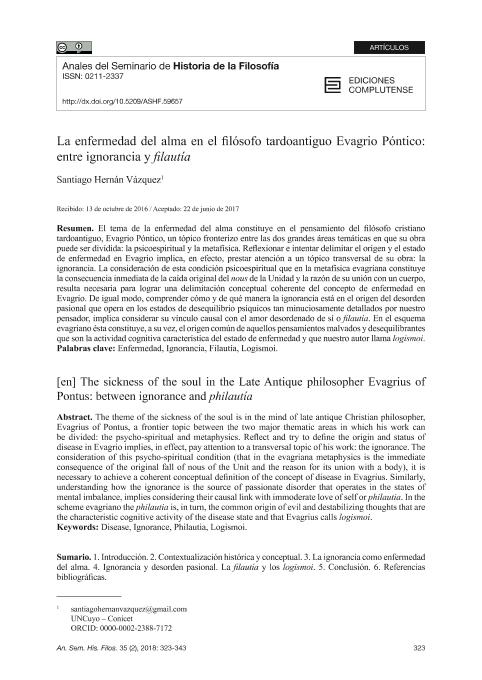Mostrar el registro sencillo del ítem
dc.contributor.author
Vazquez, Santiago Hernán

dc.date.available
2020-01-30T22:12:56Z
dc.date.issued
2018-05
dc.identifier.citation
Vazquez, Santiago Hernán; La enfermedad del alma en el filósofo tardoantiguo Evagrio Póntico: entre ignorancia y filautía; Universidad Complutense de Madrid; Anales del Seminario de Historia de la Filosofia; 35; 2; 5-2018; 323-343
dc.identifier.issn
0211-2337
dc.identifier.uri
http://hdl.handle.net/11336/96331
dc.description.abstract
El tema de la enfermedad del alma constituye en el pensamiento del filósofo cristiano tardoantiguo, Evagrio Póntico, un tópico fronterizo entre las dos grandes áreas temáticas en que su obra puede ser dividida: la psicoespiritual y la metafísica. Reflexionar e intentar delimitar el origen y el estado de enfermedad en Evagrio implica, en efecto, prestar atención a un tópico transversal de su obra: la ignorancia. La consideración de esta condición psicoespiritual que en la metafísica evagriana constituye la consecuencia inmediata de la caída original del nous de la Unidad y la razón de su unión con un cuerpo, resulta necesaria para lograr una delimitación conceptual coherente del concepto de enfermedad en Evagrio. De igual modo, comprender cómo y de qué manera la ignorancia está en el origen del desorden pasional que opera en los estados de desequilibrio psíquicos tan minuciosamente detallados por nuestro pensador, implica considerar su vínculo causal con el amor desordenado de sí o filautía. En el esquema evagriano ésta constituye, a su vez, el origen común de aquellos pensamientos malvados y desequilibrantes que son la actividad cognitiva característica del estado de enfermedad y que nuestro autor llama logismoi.
dc.description.abstract
The theme of the sickness of the soul is in the mind of late antique Christian philosopher, Evagrius of Pontus, a frontier topic between the two major thematic areas in which his work can be divided: the psycho-spiritual and metaphysics. Reflect and try to define the origin and status of disease in Evagrio implies, in effect, pay attention to a transversal topic of his work: the ignorance. The consideration of this psycho-spiritual condition (that in the evagriana metaphysics is the immediate consequence of the original fall of nous of the Unit and the reason for its union with a body), it is necessary to achieve a coherent conceptual definition of the concept of disease in Evagrius. Similarly, understanding how the ignorance is the source of passionate disorder that operates in the states of mental imbalance, implies considering their causal link with immoderate love of self or philautia. In the scheme evagriano the philautia is, in turn, the common origin of evil and destabilizing thoughts that are the characteristic cognitive activity of the disease state and that Evagrius calls logismoi.
dc.format
application/pdf
dc.language.iso
spa
dc.publisher
Universidad Complutense de Madrid

dc.rights
info:eu-repo/semantics/openAccess
dc.rights.uri
https://creativecommons.org/licenses/by-nc-sa/2.5/ar/
dc.subject
ENFERMEDAD
dc.subject
IGNORANCIA
dc.subject
FILAUTIA
dc.subject
LOGISMOI
dc.subject.classification
Filosofía, Historia y Filosofía de la Ciencia y la Tecnología

dc.subject.classification
Filosofía, Ética y Religión

dc.subject.classification
HUMANIDADES

dc.title
La enfermedad del alma en el filósofo tardoantiguo Evagrio Póntico: entre ignorancia y filautía
dc.title
The sickness of the soul in the Late Antique philosopher Evagrius of Pontus: Between ignorance and philautía
dc.type
info:eu-repo/semantics/article
dc.type
info:ar-repo/semantics/artículo
dc.type
info:eu-repo/semantics/publishedVersion
dc.date.updated
2020-01-29T22:35:31Z
dc.journal.volume
35
dc.journal.number
2
dc.journal.pagination
323-343
dc.journal.pais
España

dc.journal.ciudad
Madrid
dc.description.fil
Fil: Vazquez, Santiago Hernán. Consejo Nacional de Investigaciones Científicas y Técnicas; Argentina. Universidad Nacional de Cuyo. Facultad de Filosofía y Letras. Instituto de Filosofía. Centro de Estudios Filosóficos Medievales; Argentina
dc.journal.title
Anales del Seminario de Historia de la Filosofia
dc.relation.alternativeid
info:eu-repo/semantics/altIdentifier/doi/http://dx.doi.org/10.5209/ASHF.59657
dc.relation.alternativeid
info:eu-repo/semantics/altIdentifier/url/https://revistas.ucm.es/index.php/ASHF/article/view/59657
Archivos asociados
